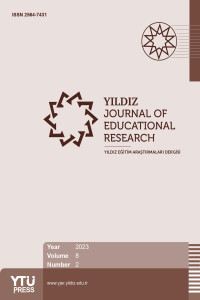Araştırma Makalesi
Amaç ve Kapsam
YILDIZ Eğitim Araştırmaları Dergisi (YEAD), eğitimin her alanında araştırma makaleleri yayınlayan uluslararası, açık erişimli, hakemli, akademik bir dergidir.
Dünyada "herkes için kaliteli eğitim" vizyonuna sahip YEAD, tüm eğitim bilimleri alanları, araştırma yöntemleri ve tasarımında güncel gelişmelere odaklanarak eğitim araştırmalarına kuramsal, ampirik ve yöntemsel katkılar sunan makaleler yayınlar. YEAD, eğitim alanında faaliyet gösteren araştırmacılara, profesyonellere ve uygulayıcılara farklı yaklaşımlar sunabilecek çalışmalara öncelik vermektedir. Dergi, erken çocukluk, ilk ve orta okul eğitimi, yetişkin eğitimi, mesleki eğitim ve öğretim ve üniversite eğitimi ve alternatif eğitim dâhil olmak üzere tüm eğitim düzeylerinde çeşitli disiplin perspektifler sunan makaleleri kabul etmektedir.
YEAD Yıldız Teknik Üniversitesi Eğitim Fakültesi tarafından yılda iki kez yayınlanmaktadır. Yayınlanmak üzere gönderilen tüm makaleler yayınlamadan önce çift-kör hakem değerlendirmesine tabi tutulur.
Makale gönderimi, değerlendirme ve yayımlanma süreçlerinde yazarlardan herhangi bir ücret talep edilmez.
YILDIZ Eğitim Araştırmaları Dergisi yılda iki sayı (Haziran ve Aralık) yayınlamaktadır. Bilgisayar ve Öğretim Teknolojileri Eğitimi, Sanat Eğitimi, Eğitim Programları ve Öğretim, Eğitim Yönetimi, Eğitim Bilimleri, İlköğretim, Dil Öğretimi, Matematik Eğitimi, Dilbilim, Beden Eğitimi, Okul Öncesi Eğitimi, Psikolojik Danışmanlık ve Rehberlik, Fen Bilimleri Eğitimi, Sosyal Bilgiler Eğitimi, Özel Eğitim, Eğitim İstatistikleri ve Türkçe Eğitimi alanlarında yeni ve özgün makaleler yayına kabul edilmektedir. Dergide, nitel, nicel ve karma yöntem yaklaşımlarının kullanıldığı ampirik araştırmalara yer verilmektedir.
YEAD, Türkçe veya İngilizce yazıları kabul etmektedir. Yazarlar, yayınlanmak için gönderdikleri çalışmaların orijinal olduğunu, makalelerin daha önce başka bir yerde yayınlanmamış veya yayınlanmak üzere gönderilmemiş olduğunu kabul eder.
Yazım Kuralları
Yıldız Eğitim Araştırmaları Dergisinde yayınlanacak makalelerin aşağıdaki biçimsel özellikleri taşıması gerekmektedir:
1. Makaleler APA’6 Publication Manual (http://www.apa.org) yayın biçimine uygun olarak hazırlanmalıdır.
2. Makaleler Türkçe ya da İngilizce olarak yazılabilir. Makalenin her biri 250 kelimeyi aşmayacak şekilde Türkçe ve İngilizce yazılmış Öz ve Abstract’ı, örnek yayın kalıbında yer aldığı biçimde verilmelidir. Yazının başlığı kısa olmalı ve 15 sözcüğü geçmemelidir. Ayrıca 3 – 5 arasında Anahtar Kelimeler verilmelidir.
3.Türkçe yayınlanan çalışmaların sonunda 600 – 1000 kelime arasında ve 5 ana başlık (Purpose, Method, Results, Discussion, Conclusion) altında geniş İngilizce özet (extended summary) yazılmalıdır. İngilizce yazılan makalelerde kısa ve geniş Türkçe özet istenmemektedir.
4. Yayın dili Türkçe olan makalelerin (abstract, extended summary hariç) 7000 kelimeyi geçmemelidir. Yayın dili İngilizce olan makalede ise makalenin tamamı 7000 kelimeyi geçmemelidir.
5. Araştırma makalelerinde problem giriş bölümü içinde açıkça belirtilmelidir. Giriş bölümünü sırasıyla yöntem, bulgular, tartışma ve sonuç bölümleri izlemelidir. Deneme-derleme türü makalelerdeki bölüm başlıkları ise içeriğe uygun olarak belirlenmelidir.
6. Makalelerin YEAD yayın kalıbına uygun olarak hazırlanmış olması ve yazar isim ve adresleri makale metnine yazılmaksızın sisteme yüklenmesi gerekmektedir.
Etik İlkeler ve Yayın Politikası
Open Access Policy
Yıldız Journal of Educational Research (YJER) supports the Budapest Open Access Initiative statement of principles that promote free research literature access. The declaration defines open access to academic literature as free availability on the Internet, permitting users to read, record, copy, print, search, or link to full texts of research, examine them for indexing, use them as data for software or other lawful purposes without financial, legal, or technical barriers. Information sharing represents a public good and is essential to the advancement of science. Therefore, articles published in this journal are available for use by researchers and other readers without permission from the author or the publisher, provided that the author and the original source is cited. The articles in YJER are accessible through search engines, websites, blogs, and other digital platforms.
Additional details on the Budapest Open Access Initiative and their guidelines are available at https://www.budapestopenaccessinitiative.org/, including a Turkish translation of the recommendations at http://www.budapestopenaccessinitiative.org/boai-10-translations/turkish-translation.
Ethics Policy
The observance of ethical principles throughout the research and publication process is fundamental to ensuring the integrity of the work and furthering the goal of contributing to and sharing high-quality, objective, reliable, and useful information.
Yıldız Journal of Educational Research has adopted ethical principles based on the guidelines prepared by the Committee on Publication Ethics (COPE) (https://publicationethics.org/). We implement these processes to ensure appropriate support for our authors and their institutions, and our readers. All stakeholders in the process (authors, readers and researchers, publishers, reviewers, and editors) must comply with ethical principles.
Ethical Responsibilities of the Authors
• Studies submitted for publication must be the original work of the author. References to other studies must be cited and/or quoted entirely and accurately;
• Only those who provide a substantial intellectual contribution to the content of the work may be cited as an author. Other contributors may be recognized in the acknowledgments section of the article;
• All competing interests or relationships that may be perceived to constitute a conflict of interest must be declared and explained;
• All studies involving human or animal subjects must comply with national and international laws and guidelines regarding privacy and ethical conduct (e.g., World Medical Association Declaration of Helsinki, US National Institutes of Health Policy on the Use of Laboratory Animals, EU Directive on the Use of Animals) and the details of approval and observance should be indicated in the Materials and Methods section of the manuscript;
• Authors must be able to provide documentation showing that they have the right to use the data analyzed, all necessary permission related to the research, and appropriate consent;
• Raw data and other material used in the article must be available and may be requested from the author(s) in order to verify the validity of the reporting;
• In the event the author(s) notice an error at any point in the publication process or after publication, they have an obligation to inform the journal editor or publisher and cooperate in appropriate corrective action;
• Authors may not submit their articles for publication to more than one journal simultaneously. Each application must be initiated following the completion of any previous effort. Previously published articles, will not be accepted, including translations, without the proper acknowledgment of the original author;
• Once the evaluation process has begun, changes in authorship designation (such as adding authors, changing the printed order of the authors, removing an author) will not be accepted in order to protect all parties involved.
Ethical Duties and Responsibilities of the Editors
The editor is responsible for everything published in the journal. In the context of this responsibility, editors have the following duties and obligations:
• Endeavor to meet the needs of readers and authors;
• Maintain continuous development to improve the journal;
• Consistently work to ensure quality and academic integrity. The editor is responsible for confirming that the publishing policies and standards are upheld;
• Support freedom of thought;
• Prevent business needs or other considerations from compromising intellectual and ethical standards, including acting in a balanced, objective, and fair manner in the course of their duties without any discrimination based on gender, religious or political beliefs, ethnic or geographical origin, sponsorship, renown, or other influence;
• Apply the publicly defined publication policies created and enforced to ensure a timely and impartial evaluation process for all submissions;
• Protect intellectual property and defend the rights of the journal and author(s);
• Demonstrate clarity and transparency. The editor is expected to ensure that any errors, inconsistencies, or misleading statements are corrected quickly and appropriately acknowledged;
• Perform a thorough, timely, and objective investigation of any complaint or allegation of misconduct, including providing the opportunity for the author to present information refuting accusations, and to share the findings and conclusions and implement appropriate action, which may include, but is not limited to rejection of an article.
Reader Relationship
The editor is to make publication decisions based on expectations of suitable and desirable material. Studies accepted for publication must be original contributions that benefit the reader, researcher, practitioner, and the literature. In addition, editors are obliged to take into account feedback from readers, researchers, and practitioners and provide an informative response. Readers will also be informed of any funding provided to support published research.
Author Relationship
• The decision to accept an article is to be based on the importance, original value, validity, and clarity of expression of the work, and the goals and objectives of the journal;
• Studies accepted for evaluation and publication will not be withdrawn unless serious problems are identified;
• The editor will not disregard positive reviewer comments unless there is a serious problem with the study;
• New editors will not change publishing decisions made by previous editor(s) unless there is a serious problem;
• A description of the submission and evaluation process is publicly available;
• Authors are provided with descriptive and informative feedback.
Reviewer Relationship
• Reviewers are to be selected according to the subject of the study;
• Information and guidance for the evaluation phase is provided;
• Any conflicts of interest between authors and reviewers will be disclosed and managed appropriately;
• Reviewer identity is to be kept confidential to preserve a blind review process;
• Reviewers are to evaluate the study using unbiased, scientific, and constructive comments. Unkind or unscientific commentary will not be permitted;
• Reviewers will be evaluated using criteria such as timely response and quality of observations;
• The pool of reviewers is to be assessed and supplemented regularly to ensure a broad scope of expertise.
Editorial Board Relationship
The editor works with the members of the editorial board to ensure that they are familiar with journal policies and developments in regular meetings and announcements and will provide training for new members and assistance to board members during their tenure in their role as a supporter of the journal.
• Editorial board members must be qualified and able to contribute to the journal;
• Members of the editorial board must evaluate studies impartially and independently;
• Editorial board members with the appropriate expertise will be given the opportunity to evaluate suitable articles;
• The editor will maintain regular contact with the editorial board and hold regular meetings regarding editorial policies and other aspects of journal management.
Creativity and Openness
• Constructive criticism is to be encouraged;
• Authors will be given the opportunity to reply to criticism or lodge complaints;
• Negative results will not be a reason for submission denial.
Ethical Responsibilities of the Reviewers
Peer review of research embodies the scientific method, subjecting the work to the exacting scrutiny of knowledgeable colleagues. The rigor of the review process directly affects the quality of the literature; it provides confidence in an objective and independent evaluation of the published work. Yıldız Journal of Educational Research uses a double-blind review process. All comments and the evaluation are transmitted through the journal management system. Reviewers should:
• Only agree to evaluate studies related to their specialty;
• Return reviews promptly and within the designated timeframe;
• Evaluate with impartiality. Nationality, gender, religious beliefs, political beliefs, commercial concerns, or other considerations must not influence the evaluation;
• Refuse to review any work with a potential conflict of interest and inform the journal editor;
• Maintain confidentiality of all information. Destroy manuscripts and related material following the review. Only the final published version may be used for any purpose;
• Report any suspicion of misconduct to the editor;
• Use thoughtful and constructive language intended to improve the quality of the article. Hostile or derogatory comments are not acceptable.
Ethical Responsibilities of the Publisher
The role of the publisher includes stewardship of the scholarly record. As such, the publisher should:
• Abide by ethical principles related to research integrity; the process of application, review, and selection; and publication;
• Collaborate with the editor and the editorial board to maintain and develop the journal in a relationship that recognizes editorial independence and is defined by written agreement;
• Publish content in a timely manner, including corrections, clarifications, and retractions;
• Preserve published work.
The publication processes of the journal are conducted in accordance with the guidelines of International Committee of Medical Journal Editors (ICMJE), the World Association of Medical Editors (WAME), the Council of Science Editors (CSE), the Committee of Publication Ethics (COPE), the European Association of Science Editors (EASE) and National Information Standards Organization (NISO).
Examples of some activities considered to be contrary to scientific research and publication ethics:
• Plagiarism: The representation of the ideas, methods, data, or other work of another, in whole or in part, as one's own. The original source must be appropriately acknowledged. Authors are encouraged to offer unique work that does not rely on substantial use of other sources, regardless of citation.
• Fraud: The use of fabricated or falsified data or other deceptive misrepresentation of fact.
• Distortion: Manipulation of the research records, data, images, or results, or presenting unused devices or materials as if they were used in the research, particularly in the interests of study sponsors.
• Republication: Duplicate submissions presented as unique publications.
• Slicing: The use of a portion of data or findings derived from a single research idea in multiple smaller units as separate publications.
• Inaccurate authorship: The inclusion of individuals as named authors who were not active contributors, the failure to include contributors, or the inappropriate ranking of authors.
• Lack of acknowledgement of individuals, institutions, or organizations that provided financial or other substantial support to the work.
• Use of a thesis or unpublished study without the permission of the owner.
• Failure to comply with ethical rules for human and animal research, including respect for patient rights and animal welfare, or obtaining the required approval.
• The misuse of resources, facilities, or devices provided for scientific research.
• The use of false or misleading statements.
On rare occasions, it may be necessary for a journal to impose sanctions on researchers who have engaged in questionable research practices or publishing ethics malpractice: for example, a ban against publishing any further articles in the journal when doing so puts the journal's reputation demonstrably at risk, or not permitting a researcher to serve as a reviewer or editor. Bans of this nature may be implemented for a period of time and revoked or extended if necessary upon review at the conclusion of the allotted time period. Sanctions may be appealed by writing to the journal editor.
Plagiarism Policy
Plagiarism is the theft of another's work and a violation of ethics, regardless of whether it is intentional or not. It is unacceptable conduct to submit or publish manuscripts using other sources without appropriately citing the reference. It is the policy of the Yıldız Journal of Educational Research to use plagiarism detection software for all submissions and to perform an editorial review when necessary. The editor or the editorial board may request revision or reject a manuscript that does not meet publication standards, including plagiarism, citation or other manipulation, or any fraudulent misrepresentation.
Copyright Transfer
Manuscripts submitted for publication in the Yıldız Journal of Educational Research (YJER) should be original and previously unpublished. Upon submission, the authors are obliged to declare that the study, in whole or in part, has not been previously published or evaluated for publication on any other platform. Sanctions may be applied for failure to observe this policy.
Authors agree to transfer copyright privileges upon submission to YJER. This transfer takes effect upon acceptance for publication. No part of published material may be used for any other purpose without the written permission of the publisher.
Authors should obtain any necessary permission from the copyright holder when using content previously published in printed or electronic format, including pictures, tables, or other elements. The legal, financial, and criminal responsibility resides with the author.
Authors must return a completed copyright transfer form upon submission.
Conflict of Interest
The editor is required to ensure that any conflicts of interest between authors, reviewers, or other parties are disclosed and managed appropriately to provide an independent and impartial process.
Any potential perception of a financial or personal interest that may affect decision-making creates a conflict of interest. The presence of a conflict of interest is independent of the occurrence of inappropriateness. The reliability of the scientific process and published articles is directly related to the objective consideration of conflicts of interest during the planning, implementation, writing, evaluation, editing, and publication of scientific studies.
Financial relationships are the most easily identified conflicts of interest. If undisclosed, they undermine the credibility of the journal, the authors, and the science. However, conflicts can also occur through individual relationships, academic competition, intellectual approach, and more. Authors should refrain as much as possible from any relationship that could restrict their ability to objectively access data or analyze, interpret, prepare, and publish their articles. Authors must disclose any relationships related to study submissions.
Editors and peer reviewers should also be aware of potential conflicts of interest and refrain from engaging in any activity that could be questionable, and report associations that could be perceived as presenting a conflict.
The publication team works diligently to ensure that the evaluation process is conducted in an impartial manner in order to protect the interests of all parties.
The conflict of interest form and more detailed information are available at: http://www.icmje.org/disclosure-of-interest/
Ücret Politikası
Makale gönderimi, değerlendirme ve yayımlanma süreçlerinde yazarlardan herhangi bir ücret talep edilmez.
Dizinler
Dergi Kurulları
Editör Kurulu

Dr. Selahattin Yılmaz lisans eğitimini Marmara Üniversitesi, yüksek lisans eğitimini ise Boğaziçi Üniversitesi'nde İngiliz Dili Eğitimi üzerine tamamladıktan sonra doktora eğitimini Uygulamalı Dilbilim üzerine Georgia Eyalet Üniversitesi'nde tamamladı. Aynı üniversitede ayrıca öğretim ve araştırma görevliliği yaptı. Halen Yıldız Teknik Üniversitesi Yabancı Diller Yüksekokulu'nda öğretim görevlisi olarak görev almaktadır. Uzmanlık alanı olan ikinci dilde akademik yazma becerileri üzerine yayın ve bildiri gibi ulusal ve uluslararası çeşitli akademik faaliyetlerde bulunmaktadır.


Dr. Aydın Balyer, Yıldız Teknik Üniversitesi Eğitim Bilimleri Bölümü'nde Eğitim Yönetimi alanında öğretim üyesi olarak çalışmaktadır. Araştırma ilgi alanı okul liderleri, müdürleri, mesleki gelişimleri ve çalışma koşullarıdır. Ayrıca, okullarda çeşitlilik yönetimi başta olmak üzere eğitim politikaları üzerine de çalışmaktadır.

















